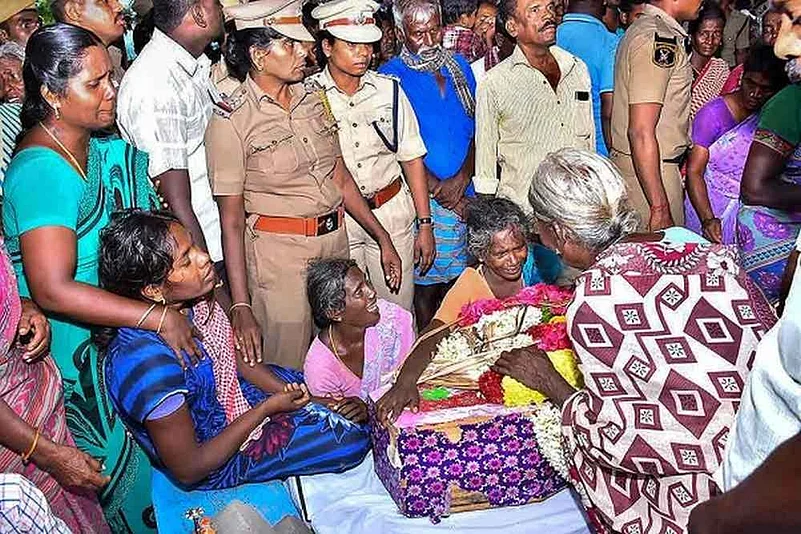The Madras High Court on Tuesday made strong observations asking whether the government needs a corpse to act on implementing each and every statute, hours after the decomposed body of a two-year-old boy was pulled out from an unused borewell.
Rescuers pulled out the decomposed and mangled body of Sujith Wilson early Tuesday from deep inside the borewell, after a futile 80-hour attempt to save the child. Wilson had fallen in the open borewell while playing near his house in a village in Tamil Nadu's Tiruchirappalli district.
Sujith had fallen into the disused farm borewell while playing near his house in Nadukattupatti. Initially, he was stuck at a depth of about 30 feet but subsequently slipped further down, and the body was finally pulled out from a depth of 88 feet.
Advertisement
After post-mortem, the body was handed over to his parents who buried him in a heart-wrenching funeral conducted by the local parish priest at a nearby graveyard.
The court impleaded the civic authorities and directed them to produce details on the action taken against violators who had failed to comply with the conditions stipulated for digging borewells and tubewells.
In its oral observations, the court also rapped the media, saying it was not streaming anything constructive in creating public awareness on the implementation of rules and regulation on borewells and tubewell. Except the media was showing a live relay on the rescue operations that eventually ended on a tragic note, it added.
Advertisement
The court further observed that the social responsibility to bring awareness fell on everybody and more so on the media, which can publish the guidelines issued by the state government based on the Supreme Courts order.
A division bench of Justices M Sathyanararayanan and N Seshasayee was hearing a petition seeking a direction to authorities for strict implementation of guidelines issued by the Supreme Court and for enforcement of The Tamil Nadu Panchayats (Regulations of Sinking of wells and Safety Measures) Rules, 2015.
The plea was filed by V Ponraj, a scientist who had worked with former president late APJ Abdul Kalam and was the Director, Technology Interface, at the Rashtrapati Bhavan.
The court said the counter-affidavit, to be filed by November 21, should have details on the number of permissions granted and the list of contractors and entities who were accorded permission to dig borewells and tubewells and the list of unused and abandoned borewells and tubewells as well as the penal action taken against the violators.
The court has impleaded principal secretaries to Municipal Administration and Water Supply Department and Rural Development Panchayat Raj as parties.
When the plea was taken up, the bench orally observed whether the government needs a "dead body" for implementation of each and every rule.
Advertisement
The petitioner, citing the Supreme Court order in 2009 and guidelines issued by the Ministry of Women and Child Development in 2013, alleged that the Tamil Nadu government did not comply with the guidelines, which led to a similar tragedy in Tiruvannamalai district in 2012.
Immediately after this incident, a plea was filed before the High Court and on the basis of the court direction, a special law to prevent such incidents was enacted and the Tamil Nadu Panchayats (Regulations of Sinking of wells and Safety Measures) Rules, 2015, came into force, the petitioner said.
The authorities did not comply with the law this time around, he said.
Advertisement
The petitioner, referring to the death of Sujith Wilson, said the main cause of the death was the failure in the implementation of both the apex court and the High Court orders and non-compliance of the guidelines.
The petitioner, pointing out to the rescue operations and the methods adopted, said: "The methods adopted by government authorities one after another clearly shows that the government is not in a position to ascertain the ground reality and not prepared or equipped with the rescue operations.”
“This is not the first incident, there were many that had taken place in Tamil Nadu,” the petitioner submitted.
Advertisement
The petitioner claimed the government did not have any solution or any technology when a disaster occurs and if rescue services were not equipped with latest technologies, the life and liberty of the people of Tamil Nadu would be at peril.




















